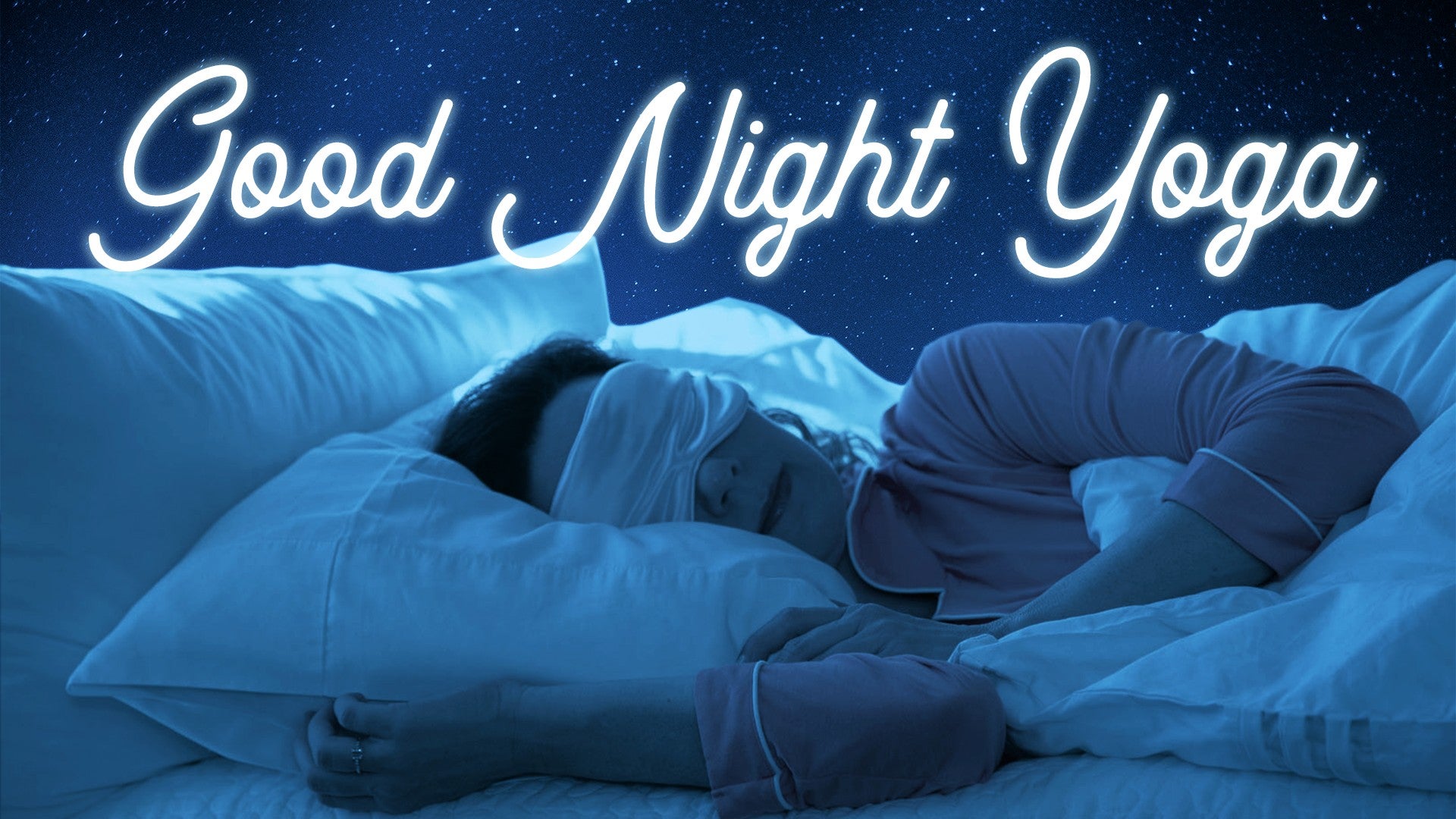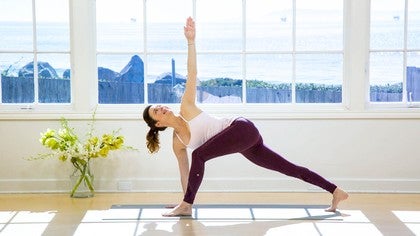Description
About This Video
Transcript
Read Full Transcript
Waking up deeply rested and refreshed is like waking up as a new person when you've been suffering from insomnia or disordered sleep. I want you to know that it's available to just about everyone and if anything we can get a little closer to that feeling. I feel, I know on those good days, I feel brighter in the eyes, I feel almost like the back of my brain has been washed and honestly I feel much more optimistic than I sometimes do after a challenging day. What very often causes disordered sleep, which is what about two thirds of us suffer from annually, is stress. Now stress gets a bad rap because it sounds like something absolutely dreadful but the fact of the matter is that we all have stress and we all actually need stress.
Stress is what keeps us up, keeps us going to a job we love or helps us be awake and aware at times that we want to be there for ourselves and for the people we love. When stress gets to be problematic is when it's either chronic and it never stops or when through our lifestyle choices or the culture we're in or certain traumas we're in we stop managing our stress. When we stop managing our stress we are affecting our sleep. There's a couple things, there's this concept of disordered sleep and when you look at disordered sleep we're talking about something that we all have or at least two thirds of us have in one year. When you talk about insomnia there's one tenth they say of Americans that suffer from chronic insomnia and as for insomnia in and of itself that's like a third of us.
That's over 60 million Americans so why I'm giving you that data is just to assure you because you'll forget this in the middle of the night but when you can't sleep or you're having unpeaceful sleep what you're simply having is a human experience. Not being able to sleep, waking up or having not so restful sleep is just a human experience. It's a part of life but the good news is through our lifestyle habits, through a yoga practice we can definitely help that human response. I know what it feels like to look at the digital clock and think I'm never sleeping again. This is it, I'm up and then I scroll forward and I think about what happens and what goes wrong in the coming day if I don't get enough rest and what happens sometimes when we have those moments of sleeplessness is that it starts to become a self-fulfilling prophecy.
Because of the way that the stress hormones work the thought pattern of being worried or being anxious about being up unfortunately can contribute to the problem or the issue of poor sleep. That's why yoga is such a delicious intervention. First it's valuable to look at what insomnia really is because insomnia can be the inability to go to sleep but insomnia is also defined as the pattern of waking up in the middle of your rest. I hear this a lot from my students, I can go to bed but I wake up at 4am or 5am and the mind is racing. There are some medical causes for insomnia and poor sleep such as sleep apnea, some things that certainly need medical care.
We know that in yoga and we're only here to augment and to complement the care that you get from your mental or health professional, no question. Disordered sleep is a little more common, that's about two thirds of us in any given year and disordered sleep is defined as insomnia yes but also a sleep that isn't very restful. If you've ever had those nights where it's like I think I slept but you feel a little tired when you get up a little groggy is if you never hit those delta brain waves or theta brain waves where the dreams are that can be disordered sleep as well. Now as a yoga therapist and teacher I find that fascinating because traditionally and classically yoga was designed to order our energy, to arrange and to order our energy. Now in yoga land we might have different names for it but it leads to the same result which can be some pretty restful sleep.
Let's talk about what really happens when we can't sleep. You see we have a lot of hormones but there's two major stress hormones that come into play when sleep doesn't get very valuable or deep. The first is adrenaline and we know this a lot and we need that adrenaline response right because adrenaline is such a deep response it happens in this more intricate response that happens between the hypothalamus and the pituitary and the adrenals but it happens super fast right because that happens what our yoga practice can do and can help us do is find a point of interception with that response. One of the best ways of intercepting that response is through deep breathing. So a lot of the techniques that we have in this season of good night yoga are these points of intervention of moving into that adrenaline response and teaching the body and mind to have a much calmer reaction to the adrenaline hitch.
The second thing that happens especially in chronic stress which remember is kind of the culprit right well what happens with chronic stress is that we start to have high levels of cortisol in our blood. So it's said when they test this that elevated levels of cortisol can remain in the bloodstream for up to two hours even after a simple quarrel or after a little bit of a moment of irritation when you're driving. The body stays a little weak with that cortisol still moving through the bloodstream. Now that chronic release of cortisol the chronic release of stress is actually pretty bad. It's a precursor to heart disease or larger issues which is why sleep experts say that if we really want to start to order our sleep ideally we start to chill out and unravel and calm our senses up to two hours before we go to sleep.
Luckily there's a lot of information out there on a good sleep routine and some healthy lifestyle and sleep habits. Going over those from the context of yoga and also Ayurveda which is the health practices that grew alongside yoga for over five thousand years we see a lot of correlations between how we can stay calm and prepare for sleep and what the modern experts say about a healthy sleep routine. So let's start with the bedroom. Ideally what we want from the bedroom is we want a place that is only being used for sleep and sex and maybe getting up and getting dressed in the morning. So that means taking the screens out of the bedroom.
This is ideal. Even finding alarm clocks that don't have any light to them. You're using your phone instead but putting your phone on sleep or do not disturb so that you know that you're not going to get that little dopamine hit and see the light pop up. That means when you're practicing our season I've encouraged you along the way to even turn around the screen if it's in your bedroom right or turn off the light and just listen to the audio once you know what you're doing. It's useful if you have a lot of light coming in through any windows.
It's useful to invest in some blackout screens. What I really love are sleep masks and I know it takes some people some time to get used to sleep masks. I assure you finding a sleep mask improved my sleep exponentially. I couldn't believe how wonderful it was. In our series we have a couple things that you can do in bed, some body scans, some nice like simple gentle yoga to prepare for sleep.
Another thing that's shown to work, there's a little bit of data on it, is lavender oil or the sense of lavender. It's also advised by sleep experts that you consider making some ambient noise tracks in the bedroom. That might be that you have a fan on which is nice for air circulation or you might like an ambient noise track where they have these ambient noise, white noise machines. If you're using yoga sounds, here's what really works. Instrumental music or repetitive mantras, repetitive chants, nothing too arresting.
A lot of these chants have been designed and refined over the millenniums to calm us down. They have a slow beats per minute of BPM. Finding those tracks, so delicious. I especially recommend that if you have to sleep on a plane. Those repetitive mantras are so useful for helping trying to find some sleep on a plane.
The last thing I'd advise for the bedroom, and this also comes with sleep experts, is that the room should be kept pretty cool, about 65 degrees to 68 degrees. That means you might have a few more covers, but it's easy to do in a lot of different climates, to keep the room cool. You might as well try these things and see what works for you. Another thing that can keep us up at night is pain. Pain is also a human condition, but there's sometimes where the pain goes on too long or for whatever reason, we can't take anything to manage this pain or with our doctor's help, we want to limit what we're taking to manage the pain.
That's where we can turn to the yoga practice as a means of intervention. Pain does really, really weird things to the brain. It starts to confuse the way that we perceive our bodies, but the yoga philosophy says that you're not your pain, and through your practice, you can change your relationship to pain. During my research for Goodnight Yoga, I turned a lot to my own personal story, but I also turned to the experts. It was amazing how often I saw that changing our mind and turning to a state of gratitude and love can deeply improve our sleep.
When we practice heart breathing, when we practice a heart-centered meditation, we're shifting our focus. The sutras often say, in fact, I'll point out one yoga text. The yoga sutras are these texts that really inform us in modern yoga as well as they should. One of the more famous ones says, when disturbed by negative thoughts, replace them with a positive one. With thoughts of love, with thoughts of gratitude, gratefulness, it doesn't even matter to whom you're directing your love.
For these meditations and practices, or in self-soothing yourself when you go to bed, you can think of a pet. You can think of someone from your past. You can think of yourself. You can think of someone from your future. Any focus is good and helps us manage our disturbing and negative thoughts.
What a relief. In this human experience of disordered sleep, troubled sleep, or insomnia, we actually have a culprit. There's sort of an elephant in the room, and that is our culture. It's something that I see and experience 100% in New York City. That is that one of the ways that we reward ourselves when we work well is with more work.
What we reward in our culture is working hard. It's almost like we feel we don't deserve our rest. We're not good enough to enjoy our sleep and rest. And sleep and rest is something that we don't just deserve, but we dearly need. It's the rest that is valuable to us and helps our performance next time we go to work or do what it is we need.
For me, the experience of getting a better night's rest had to first begin and ultimately end with one of self-value and of self-love. Good night's rest is care for the caregiver, which will only make you better at what it is you already do so well. How does a good night's rest ultimately feel? Good.
Good Night Yoga: Dana Slamp
Comments
You need to be a subscriber to post a comment.
Please Log In or Create an Account to start your free trial.















